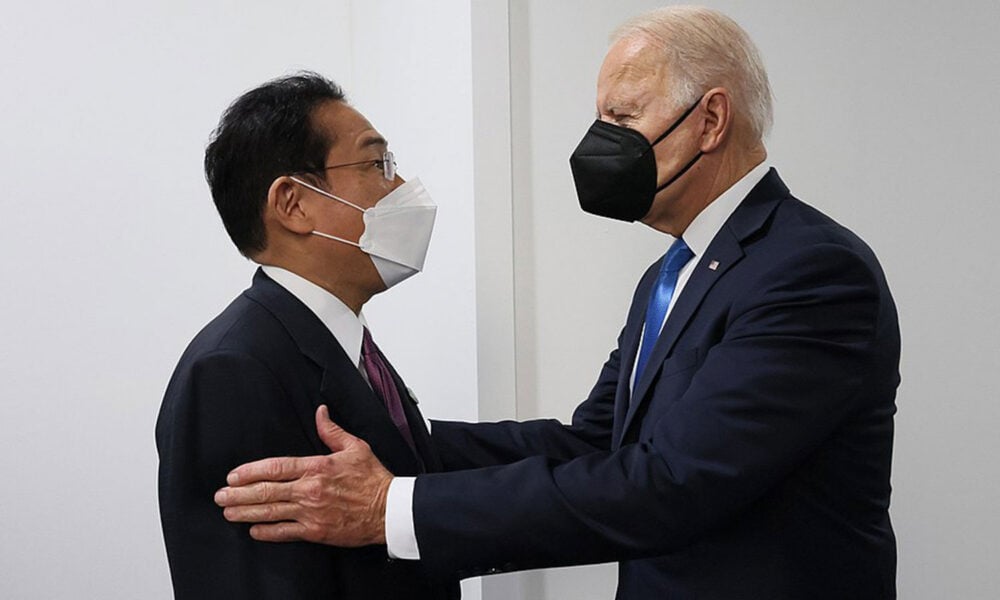Hard-line critics of President Biden often say he makes the United States look weak. But during his visit to Japan he appeared to strengthen the bilateral relationship and encourage Prime Minister Kishida Fumio, who is worried the war in Ukraine could bring war to his country.
Biden was reassuring. He looked like a leader who genuinely cares about the Japanese people. And his younger counterpart conveyed a respectful deference to a trustworthy elder statesman with invaluable knowledge and experience that can help him keep Japan safe and free.
The right message to China on Taiwan
Biden’s comments on Taiwan were especially important. Many Japanese people fear China’s leaders could treat their Asian neighbors with the same vainglorious and callous disregard that propelled the Russian army into Ukraine and Europe into war.
Biden’s remarks were not a gaffe, or a departure from the status quo. The US government recognizes that the Republic of China (ROC)–the official name of the government of Taiwan–is a part of China. But the United States is also committed to helping defend it if the government in Beijing uses military force against its counterpart in Taipei. That’s been US policy since US President Harry Truman put the 7th fleet in the Taiwan Strait after Kim Il-sung attempted to use military force to unify Korea in 1950.
Communist China and the United States have been preparing for a military encounter over Taiwan almost as long as Biden has been alive. The Shanghai Communique of 1972 and the Taiwan Relations Act of 1979 were more products for US domestic political consumption than articulations of de facto US policy. The language in these and other public documents is intentionally fuzzy. The confidential mutual understandings that 1) the United States will not support independence for Taiwan and 2) the United States is prepared to respond to the use of military force by Beijing, are reasonably clear.
Undermining either of those understandings could make the worst fears of the Japanese people come true. Biden reinforced both to great effect. His comments on defending Taiwan made public what was privately assumed. They went a long way towards relieving Japanese anxieties that Chinese President Xi Jinping could make the same miscalculation as the Russian leader he seems to admire.
At the same time, Biden’s reaffirmation of support for a single China that includes Taiwan relieved Beijing’s growing fears that the United States would change a position on the island’s sovereignty established by US President Franklin D. Roosevelt at the Cairo Conference in 1943. That position was unchallenged by the governments in Taipei and Beijing for nearly five decades until ROC President Lee Teng-hui attempted to unilaterally change that status quo in the 1990s.
US domestic political support for an independent Taiwan has been growing ever since. It reached new heights with the encouragement of former US Secretary of State Mike Pompeo. While Biden’s public comments on defending Taiwan may have angered Chinese leaders, his defense of the status quo on Taiwan’s sovereignty reassured them at the same time.
Clarity on both those points is welcome in Japan because it keeps the peace. Moreover, it provides a more honest and stable foundation for US-China relations than the intentionally deceptive approach taken by Henry Kissinger and Richard Nixon in 1972, and continued by Zbignew Brzezinski and Jimmy Carter in 1979.
A personal touch
Biden’s official messages on North Korea were less constructive.
The joint US-South Korean decision to support the resumption of large-scale military exercises will increase the risk of war. Every time they hold them, the North Korean government worries the military exercises may be a prelude to an invasion. As Russia demonstrated in Ukraine, sometimes they are.
Biden’s regurgitation of unrealistic rhetoric on denuclearizing North Korea will inhibit the initiation of an urgently needed dialogue on steps all parties could take together to make the outbreak of war less likely.
But Biden did one remarkable thing that may strengthen the alliance’s ability to talk to the mercurial government in Pyongyang with one voice. For reasons passing understanding, during the 1970s and 1980s North Korean leaders cruelly abducted at least 17 Japanese citizens. Former Japanese Prime Minister Yoshihide Suga once suggested the number could be as high as 800.
In 2002 North Korea admitted it abducted Japanese citizens, promised not to do it again and allowed five of the abducted to come home. The fate of the rest remains unknown. Their family members have been steadfastly asking for a proper accounting, and their return, to no avail. US presidents routinely meet with them when they visit Japan. But Biden connected. He pulled out a picture of his late son and shared his grief at the loss of a family member. It was a powerful expression of solidarity that seemed to mean much more, to the families, and to the Japanese people watching, than the customary US promises to act.
Ties that bind
We speak differently with friends and family than we do with strangers. Biden spoke to his Japanese colleagues, and the Japanese people, with what appeared to be genuine familiarity and affection. That distinguishes him from other US politicians, like South Carolina Senator Lindsey Graham, who once told an NBC journalist he supported President Trump’s willingness to sacrifice the people of Japan in a preemptive war to stop North Korea from developing a nuclear armed missile that could reach the United States.
Japan’s leaders, and the people they represent, know that US proponents of an “America First” approach to the world, like Senator Graham, are waiting in the wings and have a very good chance of returning to power in Washington. Their vision of the US-Japan alliance is transactional and dominated by discussions of military hardware. President Biden’s is rooted in a sense of shared values, common destiny, equality, and mutual responsibility. The “America First” approach seems selfish, weak, and likely to fail. Biden’s seems stronger and more likely to succeed.

